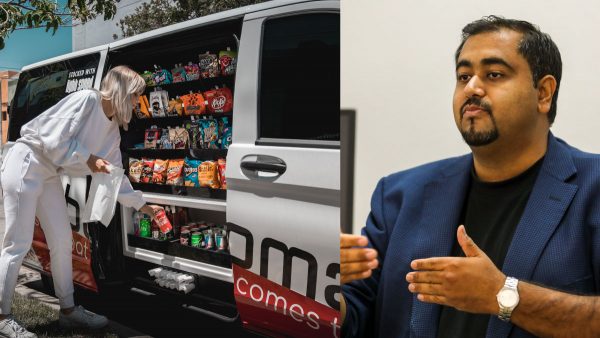
Ali Ahmed is bringing the future of retail to your curbside.
His company Robomart is revolutionizing the industry by delivering groceries, snacks, prescription drugs, ice cream and other must-have items directly to consumers through a fleet of on-demand mobile stores.
Robomart made its public debut last summer in West Hollywood, its first operating zone.
Ahmed recently received a patent for the one-tap store-hailing and seamless checkout-free technology used by Robomart’s store-on-wheels vehicles. Consumers hail a Robomart to their location using the company’s app. When it arrives, you swipe across the app to open the door to the vehicle, then pick what you want and be on your way — no check-out is necessary, thanks to RFID technology.
The company is growing quickly, and Ahmed is eager to introduce the world to his vision.
Where did you grow up? Go to school?
I grew up in Kuwait, Dubai, and Karachi, before moving to the UK to pursue my higher education. I hold an MBA from IoBM and a Masters in Advanced Marketing from Lancaster University and was a PhD candidate for the HighWire program at Lancaster which I dropped out of in order to pursue my first startup.
How did you end up in Los Angeles?
I moved to the US in 2017 to start Robomart. We were based in the Bay Area for three years before moving to L.A. in 2020 to set up our launch. WeHo was the ideal first market for our service and makes up our first operating zone.
What was the inspiration to start Robomart?
While working together at Unilever more than a decade ago, my cofounder Emad and I dreamt up on-demand mobile stores. He was in the ice-cream division and wanted to recreate the ice-cream van but have it be for everything else, and be on-demand. At the time there were no smartphones let alone apps, so we parked the idea. I spent a few years in the U.K. building the fastest growing on-demand delivery startup at the time, and when I moved to the U.S. in 2017 got back in touch with Emad and we both realized that by reigniting our original vision we could completely revolutionize shopping and delivery. Shortly thereafter our third cofounder Tigran joined us after building autonomous robots for half a decade, and we started Robomart.
What are the best selling items in West Hollywood?
On Snacks Robomarts the bestsellers are Fiji water, Gatorade, and Swedish Fish, and on Pharmacy Robomarts the bestsellers are paper towels/toilet paper, men’s razors, Advil and Burt’s Bees.
How are Robomart vans protected against theft?
We have cameras that serve as a deterrent. Also customers are averaging under a minute shopping in front of the Robomart so the likelihood of a thief running up to swipe something is very low.
On average, how much higher are Robomart prices versus traditional convenience stores?
Currently prices are at par with store pricing. However I should clarify, we are not a retailer. We are the platform for store-hailing and our merchants deploy their own fully branded stores on wheels. They set pricing of their products, and we expect many will be price competitive with store prices.
What other products/services do you dream of being able to deliver via Robomart one day?
We have started with Snacks and Pharmacy robomarts, and are now introducing Grocery, Cafe and Ice Cream Robomarts. These are very exciting and we have considerable interest from retailers to join the platform for these categories. We’re only scratching the surface of what’s possible for store-hailing, and in the future can envision even more robomart types such as hot food, electronics/accessories, sporting goods, apparel, tools, toys, and more.
Visit Robomart on the web and on the App Store

Lets hope not. This is absurd.
I can’t imagine that this business model is sustainable. A driver goes around and stops many places for an average sale of a couple of bucks on average? We shall certainly see shan’t we?
How about some fresh fruit and vegetables for snacks too instead of just over processed snacks?
I don’t know where this thing is going to stop – our residential streets are crowded and not much available parking right in front of residents. But open to see how it goes.
I recall when this first came up and there was a huge amount of opposition. Some of the questions I asked when I was on the Public Safety Commission was regarding the robots on sidewalks that are not very wide & the effect on pedestrians, byclists, wheelchairs,others with disabilities?
Plus since WeHo has so many apartment buildings how would a robot access entry to a building with stairs, etc. So what would be the purpose if the customer has to leave their apartment to go downstairs/outside to get their delivery? (not to mention rainy days). Too many unanswered questions.
It does sound like an interesting idea. Hopefully it will be successful.